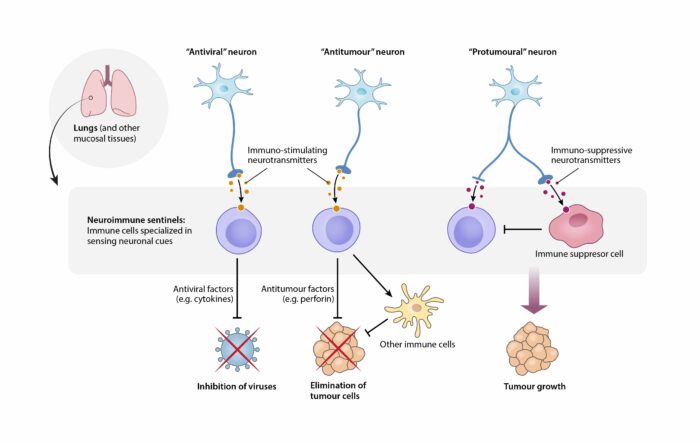

The immune system is a complex balanced network of cells that protects organisms from external environmental challenges such as pathogenic microorganisms, toxins and parasites. It is also vital to preserve physiological homeostasis and control the growth of potentially cancerous cells. A deranged immune system fails to protect against infections and tumours, and unchecked inflammation can damage other organs, as it occurs in the case of allergies and autoimmunity. To achieve the perfect equilibrium, immune cells integrate signals from the surrounding tissues and modulate their function based on microenvironmental cues derived from the microbiome, adjacent stromal and epithelial cells and molecules circulating throughout the body. Additionally, an essential component that provides immune cells with signals regulating their function are neurons and the nervous system.
Sensory neurons can directly monitor and adjust immune responses and relay information to the brain and other neuronal processing hubs to boost or reduce the activity of immune cells and maintain a healthy balance. Paradoxically, oversensitive neurons have the ability to boost immune reactions against harmless allergens, and other neurons can be hijacked by pathogens and tumours to dampen protective immunity. Therefore, investigating how neurons and immune cells control and communicate with each other represents a subject that can help us to comprehend how a dysregulated neuroimmune crosstalk may impact or drive disease and allow us to unlock new therapeutical strategies for treatment.
We would like to advance our understanding in neuroimmunology by implementing interdisciplinary approaches. Our group aims to explore and define the molecular and cellular components that participate in the dialogue between neurons and immune cells, which are pivotal to regulate immune homeostasis and immunity against cancer and pathogens. We will modulate sensory neurons and investigate how this alteration impacts immune cells such as innate and adaptive lymphocytes.
Can we identify specialized neurons with antiviral or antitumoral immunity? Which are the molecular pathways that are deployed by neurons to encourage immune cells to kill cancers? Have particular subgroups of immune cells developed tailored mechanisms to communicate with neurons and become “neuroimmune sentinels”? By implementing preclinical models, in vivo and in vitro screenings, microscopy and high-dimensional tools such as spectral flow cytometry, we hope to unravel how two of the most fascinating and intricate systems in our bodies, the immune and the nervous systems, work in harmony to promote homeostasis and protection against internal and environmental challenges.
Selected Papers
- Rodriguez-Rodriguez, N., Clark, P.A., Gogoi, M., Ferreira, A.C.F., Kerscher, B., Crisp, A., Jolin, H.E., Murphy, J.E., Sivasubramaniam, M., Pedro, L., Walker, J.A., Heycock, M.W.D., Shields, J.D., Barlow, J.L., McKenzie, A.N.J. (2022)
Identification of aceNKPs, a committed common progenitor population of the ILC1 and NK cell continuum
Proc Natl Acad Sci U S A 119(49): e2203454119 - Jou, E., Rodriguez-Rodriguez, N., Ferreira, A.F., Jolin, H.E., Clark, P.A., Sawmynaden, K., Ko, M., Murphy, J.E., Mannion, J., Ward, C., Matthews, D.J., Buczacki, S.J.A., McKenzie, A.N.J. (2022)
An innate IL-25-ILC2-MDSC axis creates a cancer-permissive microenvironment for Apc mutation-driven intestinal tumorigenesis
Sci Immunol . 7(72): - Rodriguez-Rodriguez, N., Gogoi, M., McKenzie, A.N.J. (2021)
Group 2 Innate Lymphoid Cells: Team Players in Regulating Asthma
Annu Rev Immunol . 39: 167-198 - Rodríguez-Rodríguez, N., Madera-Salcedo, I.K., Cisneros-Segura, J.A., García-González, H.B., Apostolidis, S.A., Saint-Martin, A., Esquivel-Velázquez, M., Nguyen, T., Romero-Rodríguez, D.P., Tsokos, G.C., Alcocer-Varela, J., Rosetti, F., Crispín, J.C. (2020)
Protein phosphatase 2A B55β limits CD8+ T cell lifespan following cytokine withdrawal
J Clin Invest . 130(11): 5989-6004 - Apostolidis, S.A., Rodríguez-Rodríguez, N., Suárez-Fueyo, A., Dioufa, N., Ozcan, E., Crispín, J.C., Tsokos, M.G., Tsokos, G.C. (2016)
Phosphatase PP2A is requisite for the function of regulatory T cells
Nat Immunol 17(5): 556-64
Group Members
- Jasper Carmody
- Olivia Crewe
- Leo Hesse
- Ksena Longrin
- Lauren Miller (Sweeney)
